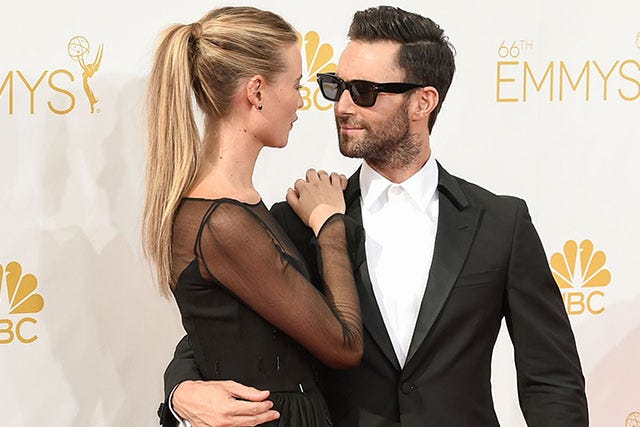 Photo: REX USA/Rob Latour.
Photo: REX USA/Rob Latour.I was eating breakfast as I was watching Maroon 5’s “Animals” and actually had to put down my bagel to heave halfway through the video. The graphic imagery is undeniably intense — there’s one particularly brutal scene which shows raw meat intercut with blood — and not something I would choose to watch over again. Despite that, I do think the video explores the taboo link between desire and danger — and, a lot of people are missing that point.
The gist: Adam Levine plays a butcher who stalks a beautiful woman (his real life wife, model Behati Prinsloo) and ends up having an elaborate, dark fantasy where the two of them are going at it, well, like animals, underneath a shower of blood. Adam Levine hasn’t released a statement regarding his motivations for the video, but plenty of critics are condemning the imagery alone, calling it “disgusting,” "disturbing," and “creepy as hell.” All valid points, but most of the critiques overlook the casting — which, to me, is what makes the video work as a piece of art.
AdvertisementADVERTISEMENT
Because Levine and Prinsloo are real life partners, the video is immediately cushioned in a clear “this is fantasy” cocoon. That's supplemented by Levine's costume — wearing a neck beard and glasses — which makes it clear he’s playing a character. And, even though these roles are disturbing, I don’t think they should be “wrong” or “taboo” within the confines of a safe, sane, and consensual relationship. Fact is, we all have a dark side, and being able to explore that — even if it is scary or weird or frightening — shouldn’t be censored. Sometimes, sexual fantasies are creepy, disturbing, and not anything that would ever, ever be done in real life. But, as long as they remain fantasies, I don’t think that’s bad — or something that’s not worthy to explore in art. By pushing the envelope to the darkest, creepiest corners imaginable, “Animals" expresses exactly that.
A lot of critics are concerned that viewers will come away from the video thinking that stalking is acceptable behavior, but I think suggesting that artists' self-censor their work based on potential public perception is treading on dangerous territory. That’s especially true when artists — and yes, that includes Adam Levine and Maroon 5 — make it clear they are playing a part. And, because Levine’s real-life wife is cast in the role of his “prey,” it’s even more obvious that the video isn’t any sort of reflection of reality — and I think that’s an important distinction to make when discussing the video.
AdvertisementADVERTISEMENT
Four years ago, when was Rihanna featured in Eminem’s “Love the Way You Lie,” critics couldn’t keep her personal life out of mind while watching the video. How could a victim of domestic abuse possibly appear in a video about domestic abuse? Entertainment Weekly wondered whether the video glorified domestic abuse and editors at feministing.com feared the video glamorized sexual violence. And, regardless of how positive or negative their review, almost every critic who wrote about the video cited Rihanna's personal experience with domestic violence — which is problematic to both Rihanna as an individual and as a performer.
Nearly four years later, the video is still a hot-button topic, with Rihanna's performative self being confused with her own identity. “Why do we insist on seeing Rihanna as a victim of domestic violence instead of an intriguing young woman and successful recording artist?” posited Bad Feminist author Roxane Gay, in her own recent exploration of the complications brought up by the video. The same question is true here: Why must we view “Animals” as some sort of veiled commentary on the role of women in Levine’s life? Why do we insist on seeing artists playing versions of themselves on screen, even when they make it explicitly clear that’s not the case?
Earlier this summer, Robin Thicke released the controversial “Get You Back” video from his Paula album, named for his estranged wife. In the video, Thicke is shown crying tears of blood, while text messages from Thicke and Patton’s real-life relationship are overlaid on screen. This video was much more dark and manipulative than “Animals,” simply because Thicke blurred the lines between his on-screen persona and his personal life. The video was clearly a thinly veiled exploration of his breakup, which was well played out in the media. That’s not art, that’s apologia.
AdvertisementADVERTISEMENT
But, by playing an obvious character in the “Animals” video, Levine isn’t trying to send any subtext about the state of his relationship, or relationships in general. He’s exploring a taboo and creating a video that is obviously going to incite controversy — and cause queasy reactions for some viewers. But, I don’t think that means he needs to be castigated as an artist or defined as a misogynist. I do think there is valid concern that music videos generally can be violent and anti-woman — but I think this is an issue that affects many videos, and can be discussed in a conversation that’s not exclusively centered around “Animals.”
At the end of the day, sexual desire isn’t always exemplified by Nicholas Sparks-style kisses in the rain. Sex can be raw, risky, fear-inducing. Really, how far removed is the Adam Levine video from any True Blood/Twilight/Vampire Diaries-type sex scene we’ve seen on screen for the past decade, where sexual encounters are anchored equally in desire, fantasy, and fear? I think that to deny or censor the dark side of fantasies, we run the danger of denying a very real part of ourselves.